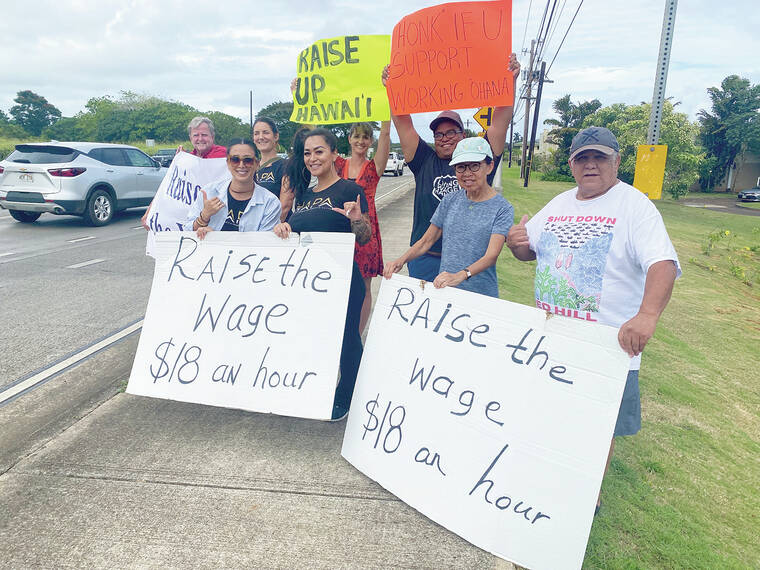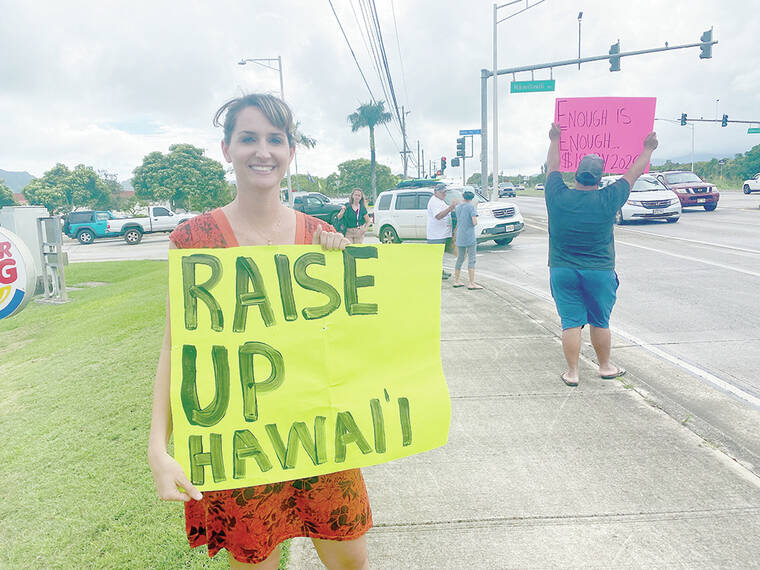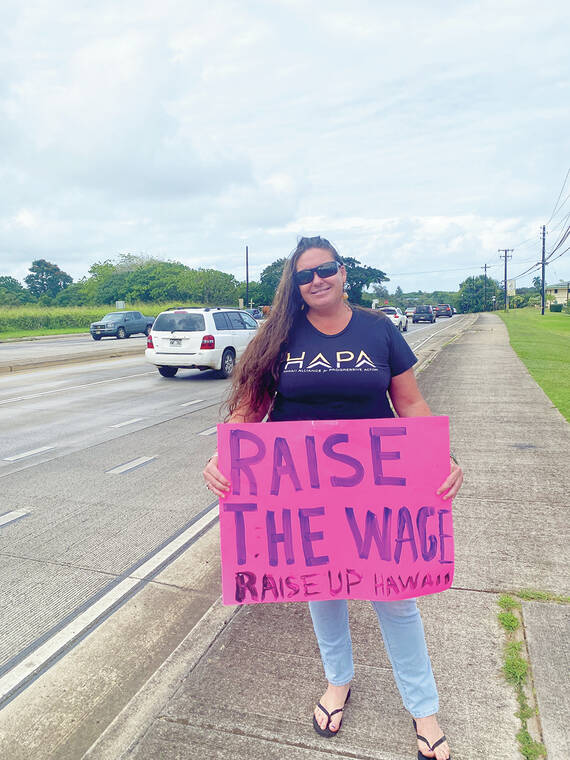LIHU‘E — After months of back and forth, the state House and Senate reached an agreement on the $18 minimum hourly wage in a conference committee session Friday.
The bill, unanimously supported by representatives from both chambers, would incrementally increase the wage in $2 increments — to $12 in October, $14 in 2024 and $16 in 2026 — until it reaches $18 in 2028.
It also increases the tip credit, which allows employers to pay tipped workers subminimum wage, incrementally to $1.50 an hour in 2028, and makes the Earned Income Tax Credit permanent and refundable.
This is a more-conservative version of the bill proposed by the Senate, which would have increased the wage to $18 an hour by 2026 while eliminating the tip credit entirely.
“While we didn’t get everything we wanted in the bill, the Senate recognized that the only way to ensure wage increases this session was to compromise with our House colleagues on the bill’s final language,” said state Senate President Ron Kouchi, a Lihu‘e resident who represents Kaua‘i and Ni‘ihau. “Recognizing that not everyone will be happy with this outcome, I want the people of Hawai‘i to know that the Senate will continue to work tirelessly to address issues related to the minimum wage and the cost of living.”
Members of the Kaua‘i delegation in the House have supported the more-conservative wage proposals, with state Rep. Jimmy Tokioka, who advocated for the increased tip credit, and state Reps. Nadine Nakamura and Dee Morikawa originally introducing a version of the bill with an even slower rate of increase.
Wages and housing
For many low-wage workers, $18 an hour could be a step towards housing security.
According to a 2021 report from the National Low Income Housing Coalition, a minimum-wage worker on Kaua‘i would need to work 116 hours a week to afford a one-bedroom apartment.
The report defines “affordability” as spending no more than 30% of income on rent, in line with the recommendations of budgeting experts.
Real wages at most Kaua‘i businesses are above the $10.10 minimum, but still do not meet the needs of renters.
The estimated mean renter wage on Kaua‘i is $14.82, meaning that a renter making the average wage still needs to work 79 hours a week to afford a one-bedroom apartment.
Kimberly Dasalia works for $15 an hour at a Lihu‘e gas station.
“When COVID hit, the landlord didn’t tell us that our house was going into foreclosure, so we got booted out of our house,” said Dasalia. “I’m working, he retired in October, and we’re having a hard time finding housing.”
They have been homeless since then, living informally on Grove Farm property.
“Yeah, it’s only three dollars — but that three dollars could very well get us into a house,” said Dasalia. “We’d love to have running water. I’m not complaining. A lot of people out there have it worse than us.”
Anne Frederick, executive director of the Hawai‘i Alliance for Progressive Action, a nonprofit which has advocated on behalf of raising the minimum wage, sees a link between low wages and homelessness.
“People are living out of their cars, under bridges,” said Frederick. “It’s a combination of the high cost of living and low wages. People are getting pushed out. It’s really sad to see generational families where their kids don’t see a future for themselves here.”
The bill, HB2510, HD2, SD1, CD1, now heads to the floor of both chambers for final floor votes before being transmitted to Gov. David Ige for his consideration.








“For many low-wage workers, $18 an hour could be a step towards housing security.” Yeah, six years from now.
Shame on the house for blocking an increase for years and then slow walking it for years into the future.
EDUCATION …. Is the key to a good job so people can make a living and afford to live here. I feel for people who think working two or more minimum wage jobs to raise a family. Gary Hooser column try’s to compare highly educated executives and their big salaries to people who have a hard time living here. It’s not the governments job to make sure people can make a living here. If you have minimum wage experience and education don’t expect life living here to be easy. You truly for the most part will never make it without a job that pays for that to happen. That’s the reality here!
Hey Fern…. Why don’t you get an EDUCATION that provides you with a job so you don’t have to stand on a sidewalk with a stupid sign. The college and many trade schools offer what you need to do in order to live here. Otherwise look into somewhere and there is plenty places to live that doesn’t cost what it does here. Don’t blame our government because you have to work two or three jobs to make it. Minimum wage jobs should have never been looked at as a way to make a living . Especially here!
Here’s proof education works for those struggling to make ends meet. My hair stylist worked low paying job and as a result of her attending our college here she graduated with a business degree and now owns a thriving salon business that has two week back log in order to get a hair cut. Now she never worries about taking care of herself and family. She just wanted to make her life better and for that I’m extremely proud of what she has accomplished. It proofs no matter your situation anyone can do this if you are willing to put forth the energy and education to do it.
With the current ugly wasteful administration policies of out of control inflation we will certainly see that a minimum wage of $18 by 2028 will show those still trying to survive that it will be worse financial condition than the $10.10 people are struggling with today. Sorry that’s the reality here.. better sign up for more education or else.
My husband was born and raised here this is his / our home yet you all make it sound like if he didnt have an education he has no right to live here the place he was born what a bunch of …..